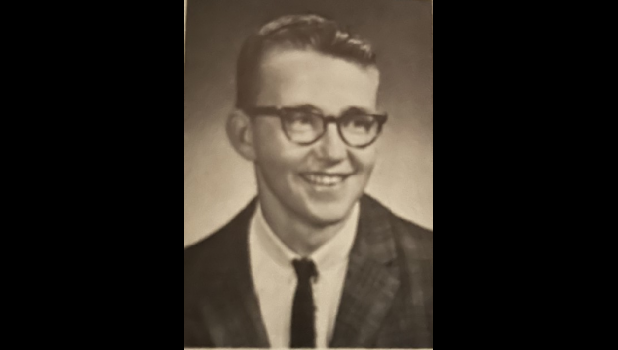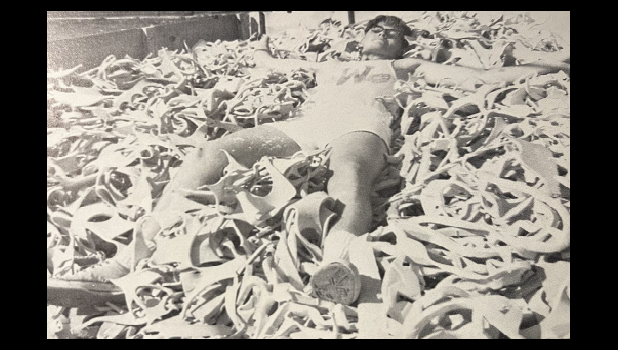Remembering Richard
Wed, 08/17/2022 - 3:09pm
admin
By:
Lonnie Whitaker
Current life events often cause a reflection on the past. Of course, that’s what this column generally does, but I’m often surprised at the simple, but meaningful, things I still recall. For example, the words a seventh-grade classmate wrote in my 1960 Willamizzou: “Never forget about when we went swimming together and staying in town and buying pickles. And what about when we pole vaulted 6-feet.”–Richard Smith.
I never forgot the lines, and if you had asked me last month what Richard had written in my 1960 yearbook, I could have told you. One Saturday, at the beginning of the school year in 1959, I saw Richard on Main Street, and although he was a fellow student in Mrs. Cape’s class, I didn’t know him well. He lived outside of town and rode the school bus, and I hadn’t seen him around during the summer.
We each had planned to see a movie at the Star Theater, but started traipsing around town together—down to the train depot, over the viaduct, and checking out things of importance in all the stores. At the MFA grocery and feed store, we bought a couple giant dill pickles and smacked on them as we meandered. We never made it to the movie, but both agreed it had been a grand day.
The swimming incident he referenced actually happened later that year, probably in November or December, because of the wintery temperature. After supper at my house, we went to Smokey Stover’s indoor pool, and not surprisingly, had it all to ourselves. We played an aquatic version of the basketball game, H-O-R-S-E, challenging each other to replicate stunts off the diving board.
I got to know Richard better after football season started. Even as one of the smaller players, he impressed everyone with his fearless tackling ability. He never played football in high school because of an injury he sustained as an infant. His father accidently backed a truck over him, and a tire squished his head. Richard said his head was “flatter than a flitter.”
Classmate Joe Corn recently told me, “My dad used his father’s car [Russell Corn’s] newer car to drive them to the hospital in Springfield. As we all know, he recovered nicely and had a peculiar-shaped head the rest of his life.” Richard would occasionally point out a flat part of his skull, but I doubt anyone would have noticed it otherwise.
Apparently, Richard’s remarkable recovery stemmed from the facts that the driveway was not paved and relatively soft and Richard was so young that his skull was still pliable enough to pop back in shape. The accident, however, damaged his eyesight, and his mother feared if his head got hit playing football at the varsity level, he might end up blind.
I never saw Richard without glasses, which were often taped in various stages of repair. One time, I was partly responsible for the damage to his glasses. In the eighth grade, a teacher made Richard stand outside the classroom for misbehaving. When the teacher wasn’t watching, he would look through the window of the door. The class would laugh, and he ducked down before the teacher caught him. When his head popped up again, I mugged a face at him, and he responded with a contorted face and wiggly hand gestures. This time, the teacher saw him and went into the hallway and slapped him, breaking his glasses. I felt a tad guilty as an unindicted co-conspirator.
As to artistic ability, Richard had no peer in our class. For an art lesson one day in the seventh grade, Mrs. Cape stacked a tubular-shaped tennis ball cannister on top of a cigar box and told us to draw it. Until that day, I harbored the idea that I had some artistic ability. I could draw the profile of Micky Mouse’s head. But Richard’s rendition of the assignment disavowed me of that notion and blew away the competition.
He captured the three-dimensional aspects in perfect proportion, with shading and texture, including the writing and artwork on the cigar box. It’s not surprising, a few years later, Richard scored high on a portion of the Differential Aptitude Test we took as juniors. I’m sure I didn’t.
With his well-known sense of humor, Richard was quick to use nicknames and catch phrases. He playfully called classmate Annette Tetrick “Tree Tick” and called me “White Acre.” Teachers weren’t off limits, either.
English teacher Jessie Munford always spoke with slang-free, formal grammar. If she agreed with a request, she would reply with the adverb “surely” rather than the more casual “sure.” Richard turned “surely” in to a comedy routine. When anyone said “surely,” he asked, “Shirley who?” and answered his own question with “Shirley Estes,” another classmate. When I saw actor Leslie Nielsen’s “Don’t call me Shirley” gag in the 1980 movie “Airplane,” I thought of Richard.
One of his catch phrases contributed to our getting kicked out of church camp. The summer of 1963, between our sophomore and junior years, the Baptist District Camp at Van Buren needed lifeguards, and hired me because I had a Red Cross lifeguard certification. They needed another lifeguard. Richard wasn’t certified, but I vouched that he was a good swimmer and could handle the job at the shallow swimming area on the Current River, and they hired him, too.
When we weren’t lifeguarding, we hung out at the camp pavilion with a teenage boy from Mountain View who had an electric guitar and amplifier. The kid was a pretty good musician and could play a few songs by the Beatles, and the three of us tried our best to imitate them. With the amplifier, the sound carried and we often gathered a crowd of kids, who joined in the singing. Richard started saying, in a weird voice, “You’ve got a good amplifier, Charlie,” The boy’s name wasn’t Charlie, which made it funnier, and the phrase became a response to everything.
I gather we weren’t the only ones who used the phrase, because after a few days, one of the directors told Richard and me that we were bad influences and our services as lifeguards were no longer needed. For whatever reason, the guitar player wasn’t eighty-sixed. Afterwards, we may have said the director had a good amplifier, too.
But my grandmother liked our singing. Richard and I spent a few weekends in Montier with my grandparents and would go to church with them and sing. He loved Grandma’s cooking, and she admired Richard’s ability to sing bass.
Richard and I shared many fun times in junior high and high school. Anyone who knew him, knew he was a devoted man of faith. He was a talented artist, the best harmony singer I ever knew, and had a unique sense of humor. Now, I’ll bet he’s hitting those deep bass notes in a Heavenly choir and adding to the smiles. Rest in peace, Smitty.


